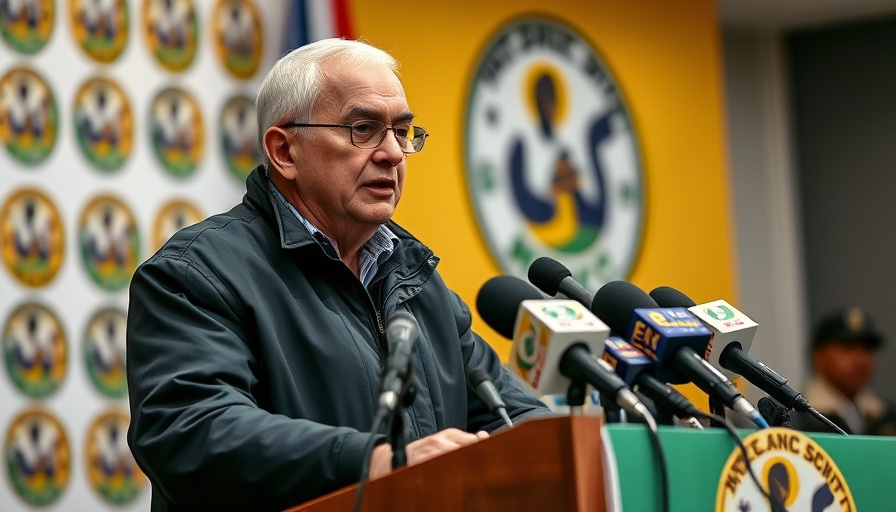
Strategic Engagement Amidst Tensions: ANC's Stance on US Relations
The African National Congress (ANC) remains steadfast in pursuing its diplomatic engagement with the United States, as articulated by Kgosientsho Ramokgopa during the party's recent National Executive Committee (NEC) meeting in Boksburg, South Africa. Emphasizing the importance of this relationship, Ramokgopa stated that despite existing tensions, particularly related to potential tariffs and the possibility of blacklisting certain party leaders, the ANC views its connection with the US as invaluable for South Africa's economic stability and growth.
The Implications of a Strained Relationship
Ramokgopa highlighted the pressing concerns regarding the Economic Growth and Opportunity Act (AGOA), noting that a withdrawal from this agreement could have significant repercussions for South Africa's economy. This concern resonates within the broader context of global trade dynamics, especially as the US reassesses its foreign policy priorities. The ANC's proactive stance reflects its commitment to maintaining the relationship that supports key trade and investment opportunities, particularly in the face of potential challenges posed by the current US administration.
Political Landscape and Internal Dynamics
The ANC's commitment to engaging with the US highlights a more significant picture regarding South Africa's coalition government and its various constituencies. Amid the approaching 2024 general elections and the 2026 municipal elections, the ANC's ability to navigate both domestic and foreign relations is crucial for bolstering voter confidence.
Furthermore, the ANC's internal landscape, characterized by different factions and leadership styles—from Cyril Ramaphosa's pragmatic approach to the more radical perspectives of other party leaders—demands a delicate balance. The party must reconcile these differences while presenting a united front on the international stage, especially regarding economic policies that are vital for service delivery and public welfare.
Broader Context: A Global Perspective
The ANC's engagement strategy is not happening in isolation. With the ongoing shifts in international relations, particularly concerning BRICS and G20 dynamics, South Africa's role as a regional leader hinges significantly on maintaining strong ties with influential powers like the US. The ANC's approach navigates potential pitfalls while also leveraging partnerships in forums that amplify economic opportunities and political alliances.
Moreover, this pledge of continued engagement aligns with the current global call for more robust diplomatic relations, particularly as nations strive to address common challenges like climate change and public health crises. South Africa must take its place in these discussions, striving for a balance between its own national interests and the larger global agenda.
Looking Ahead: Challenges and Opportunities
The ANC's resolve to engage the US amidst heightened tensions could provoke mixed responses, particularly from opposition parties such as the Democratic Alliance (DA) and the Economic Freedom Fighters (EFF), who may question the effectiveness of such strategies against the backdrop of domestic issues, including economic inequality and high youth unemployment. As the political landscape evolves, the ANC must demonstrate that its diplomatic engagements yield tangible benefits for South Africans, fostering a sense of confidence among voters.
As these developments unfold, the ANC's ability to communicate its foreign policy objectives transparently and effectively will be essential. Competing narratives regarding state capture, anti-corruption measures, and public service reforms will influence public perceptions and should be addressed to maintain credibility.
Conclusion: A Call for Engagement and Vigilance
As the ANC prepares for a critical phase in its political journey, the stakes are high for both the party and the nation. Upholding engagement with the US while navigating international and local pressures will be pivotal in shaping South Africa's future. Stakeholders across the political spectrum must recognize the importance of constructive dialogue and collaboration in overcoming geographic and ideological divides.
The path laid out by the ANC holds implications not only for the party's electoral prospects but also for the resilience of South Africa's economic framework. It's imperative for citizens and political actors alike to remain vigilant and engaged, advocating for policies that reinforce South Africa's standings on both domestic and global fronts.
 Add Row
Add Row  Add
Add 




Write A Comment